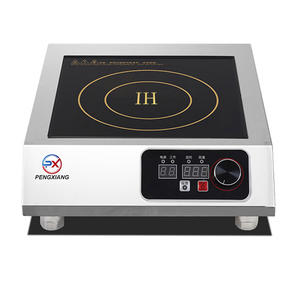In recent years, the culinary world has witnessed a significant technological evolution, particularly in the realm of kitchen appliances. At the forefront of this revolution is the commercial induction cooktop, a device that is redefining the standards of efficiency, safety, and precision in professional kitchens.

A commercial induction cooktop is a type of stove that uses electromagnetic fields to heat cookware directly, as opposed to traditional gas or electric stoves that heat indirectly through thermal conduction. This method of cooking offers a myriad of advantages that make it particularly appealing for commercial kitchens where speed, consistency, and energy efficiency are paramount.
Efficiency and Speed
One of the primary benefits of a commercial induction cooktop is its efficiency. Induction cooking can transfer up to 90% of the energy produced directly to the food, compared to approximately 40-55% for gas and electric stoves. This means that induction cooktops can boil water and cook food significantly faster, which is a crucial factor in high-paced restaurant environments. Chefs can expect a more responsive and controllable cooking experience, allowing them to achieve precise temperatures almost instantaneously.
Safety Features
Safety is another critical advantage of induction cooking. Since the cooktop itself remains cool to the touch and only the cookware gets heated, the risk of burns and fire hazards is dramatically reduced. Many commercial induction cooktops come with built-in safety features such as automatic shut-off, pan detection, and overheat protection, further enhancing the safety profile of these appliances.
Energy and Cost Savings
From an economic perspective, the energy efficiency of commercial induction cooktops translates into substantial cost savings. Less energy consumption means lower utility bills, which is an attractive proposition for restaurant owners looking to minimize operational costs. Additionally, the reduced heat emission helps maintain a cooler kitchen environment, potentially lowering the costs associated with air conditioning.
Environmental Impact
Induction cooktops also contribute to a greener kitchen. With their high energy efficiency and reduced emissions, they offer a more environmentally friendly alternative to traditional gas stoves. This aligns with the growing trend towards sustainability in the food service industry, where businesses are increasingly seeking ways to reduce their carbon footprint.
Challenges and Considerations
Despite these benefits, there are some challenges to consider. The initial investment for commercial induction cooktops can be higher than for traditional cooking equipment. Furthermore, they require compatible cookware made of ferrous metals like cast iron or stainless steel. However, many chefs and restaurant owners find that the long-term savings and improved performance outweigh these initial costs.
In conclusion, commercial induction cooktops represent a significant advancement in cooking technology, offering unparalleled efficiency, safety, and precision. As more commercial kitchens recognize these benefits, the adoption of induction cooking is likely to continue to grow. For chefs and restaurateurs, investing in induction cooktops could mean faster cooking times, lower energy bills, and a safer, more sustainable kitchen environment. As the culinary industry evolves, the commercial induction cooktop stands out as a symbol of innovation and progress.